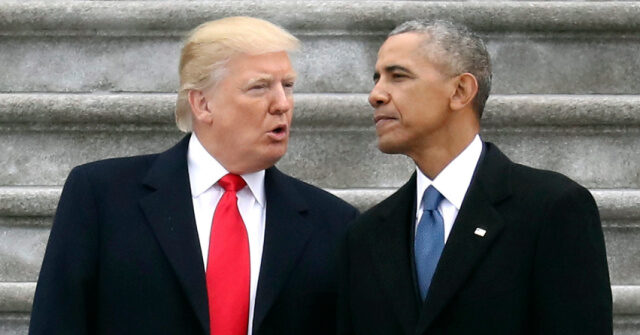President Donald Trump is pursuing a nuclear deal with Iran, hoping to end the threat of Iran becoming a nuclear power.
Supporters of Israel are worried, because the Trump negotiating team has, thus far, made similar moves to those that President Barack Obama made — moves that were later seen as catastrophic mistakes.
Trump is betting that he can succeed where Obama failed. But there are several worrying signs.
One is that the Trump administration appears, like the Obama administration, to have leaked sensitive details of Israeli plans to attack Iran’s nuclear sites.
Obama’s goal in 2012 was to stop Israel from doing anything to jeopardize a grand bargain with the Iranian regime. Trump’s goal in a similar leak this week to the New York Times appears to have been to pressure Iran, but Israel is, nonetheless, reportedly dismayed.
Another mistake is to suggest that Iran will merely have to stop enriching uranium — not to destroy its nuclear program, or come clean about past violations of international nuclear agreements.
That is the same formula that Obama used, and it failed to deter the regime.
Special Envoy Steve Witkoff later clarified that Iran would, in fact, have to “eliminate” its program — but stopped well short of demanding full transparency.
A third repeated mistake is to weaken Prime Minister Benjamin Netanyahu.
Trump has not tried to humiliate Bibi, as Obama did; or to oust him, as Biden did. However, bringing the Israeli leader to the White House earlier this month, only to surprise him with a public announcement of direct talks between the U.S. and Iran, hurt Netanyahu domestically and made him less threatening to Iran, albeit perhaps unintentionally.
The net effect of these mistakes has been to set up a situation in which the Iranians might choose simply to play for time, betting that Trump will choose to avoid war and its consequences.
Alternatively, Iran might offer a deal that simply repeats the 2015 agreement, which did nothing about Iran’s support for terror or its internal human rights abuses. And Trump, looking for a foreign policy win, might be tempted to take it.
But there are also several differences between Trump’s approach and Obama’s.
One is that Trump, at least, is aware of the possibility that Iran might be trying to swindle him. “I think they’re tapping us along,” he said this week.
The implication is that Trump could soon run out of patience, and turn to a military option. And while Obama often said that a military strike was “on the table,” no one took him seriously. Trump, on the other hand, is actively attacking the Houthis, Iran’s proxies in Yemen, meaning that Iran has reason to fear.
Circumstances have also changed. Iran has few air defenses left, after Israel destroyed most of them last year, in response to the regime’s unprecedented, massive ballistic missile attacks. That means Iran has no room for error.
And while Iran ramped up enrichment under Biden (not right after Trump left the old deal, as Democrats have falsely claimed), Israel’s covert attacks on its facilities have set back Iran’s progress and weakened the regime.
No one could deny that Trump takes Iran seriously as a threat to American national security, or that he backs Israel. But there are prominent voices in Trump’s orbit — notably, media entrepreneur Tucker Carlson — who have vocally opposed military action against Iran. The extent of their influence in the White House is unclear.
One thing that Trump has done well is to reach out directly to the Iranian people. He did so in his first term, when he called off an airstrike that was to have retaliated for Iranian attacks on Saudi Arabia. In so doing, Trump expressed concern for civilian casualties, sending the message that he cared more about Iranians than their own government did. He continues to talk about a brighter future of relations between the two nations.
It may be that Trump can achieve a deal that stops Iran’s nuclear program, prevents it from threatening its neighbors, and creates new internal pressure that will, over time, allow Iranians to take control of their own destiny.
But like his tariff policy, Trump’s outreach to Iran is a gamble.
And Israel may eventually act on its own anyway, if it feels that Trump’s diplomacy is faltering.
Netanyahu knows well that time is running out.
Joel B. Pollak is Senior Editor-at-Large at Breitbart News and the host of Breitbart News Sunday on Sirius XM Patriot on Sunday evenings from 7 p.m. to 10 p.m. ET (4 p.m. to 7 p.m. PT). He is the author of The Agenda: What Trump Should Do in His First 100 Days, available for pre-order on Amazon. He is also the author of The Trumpian Virtues: The Lessons and Legacy of Donald Trump’s Presidency, now available on Audible. He is a winner of the 2018 Robert Novak Journalism Alumni Fellowship. Follow him on Twitter at @joelpollak.
Read the full article here


